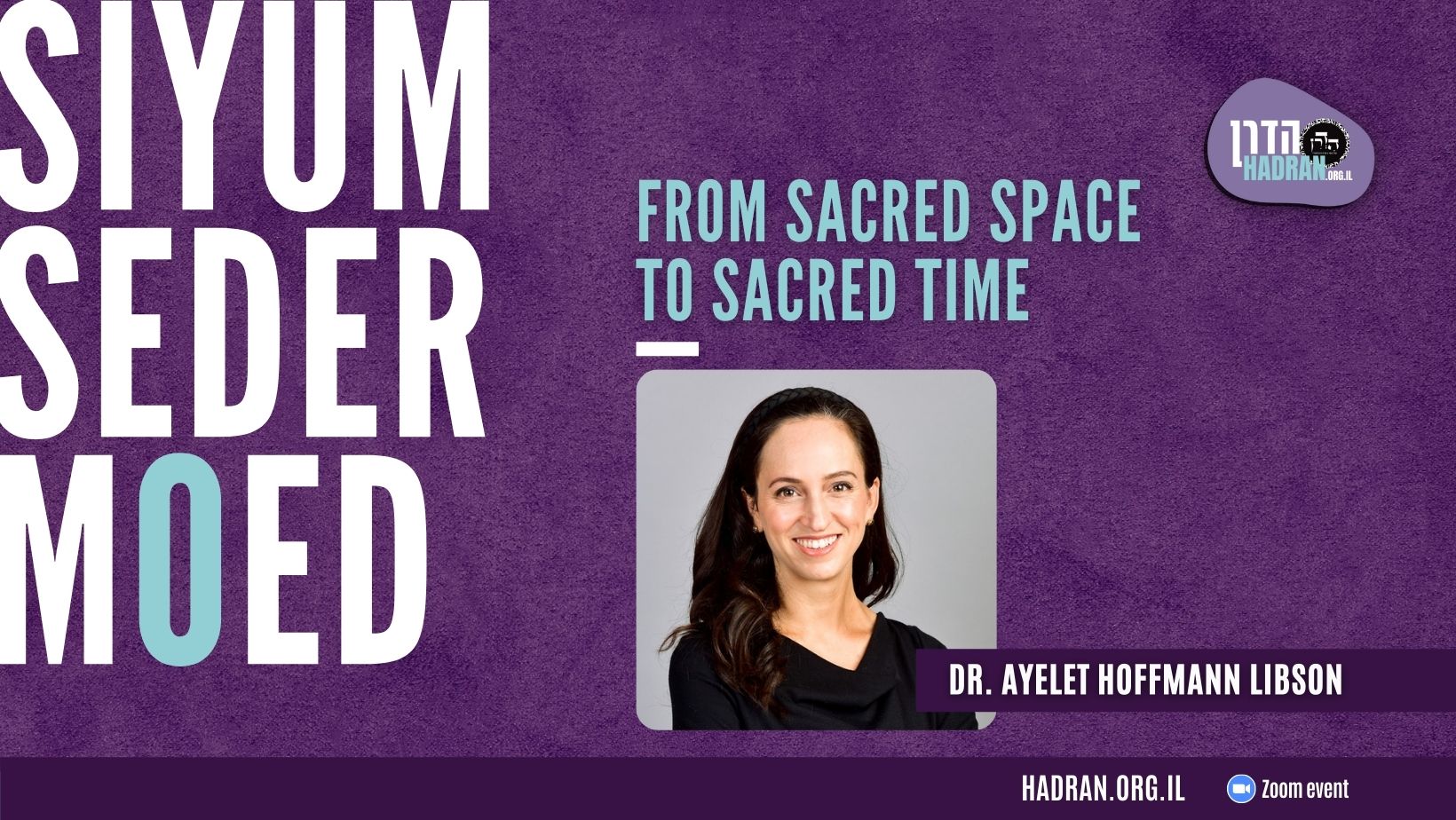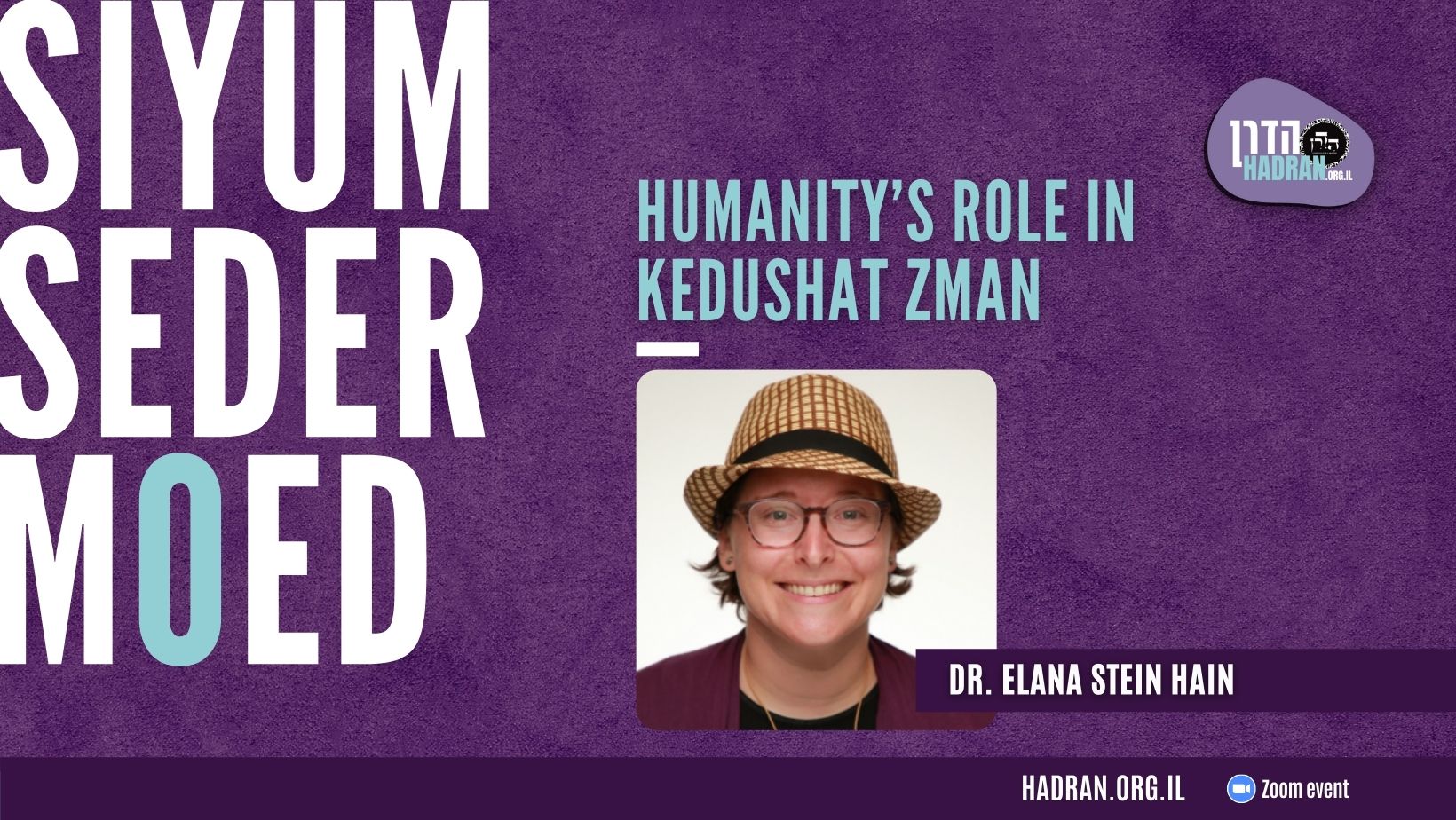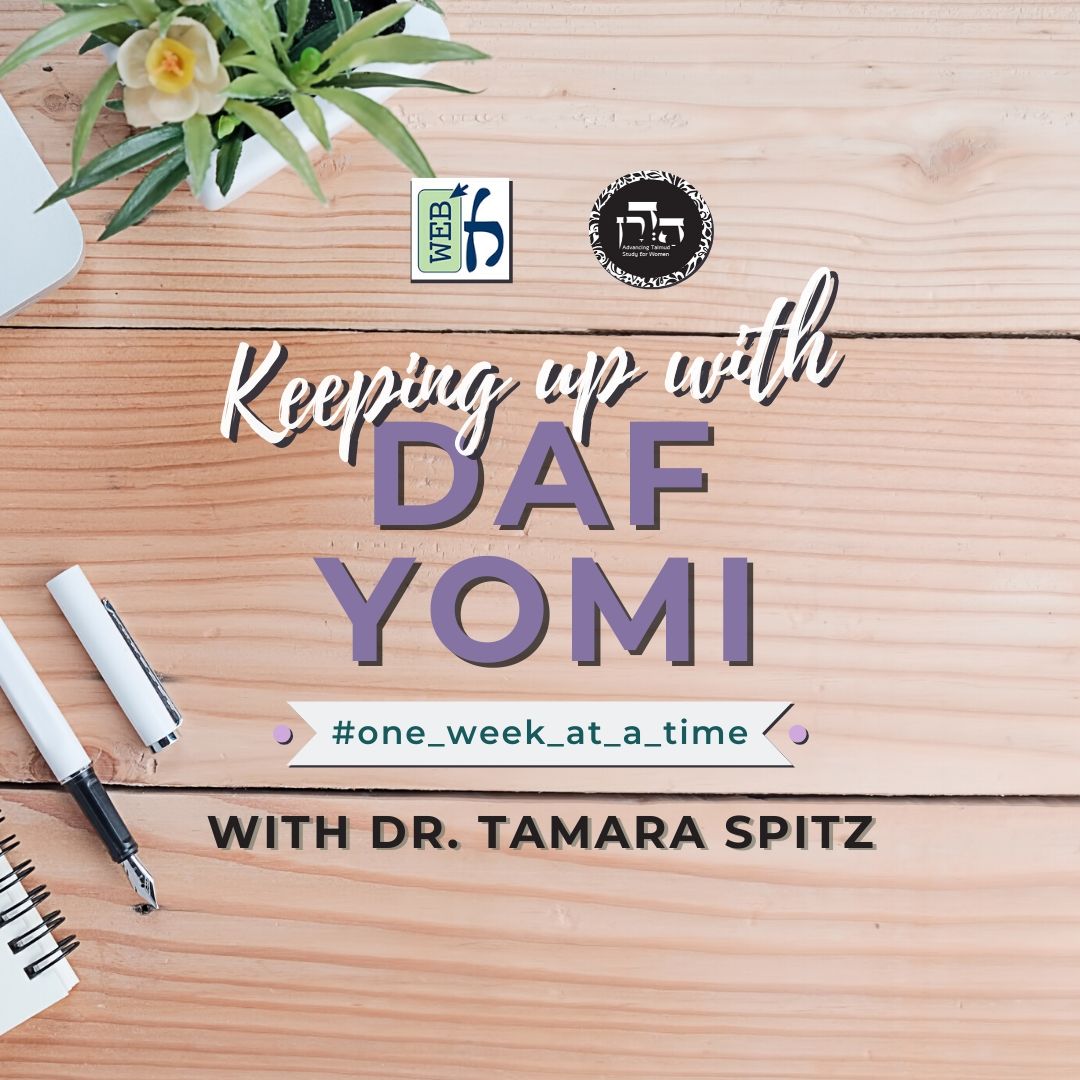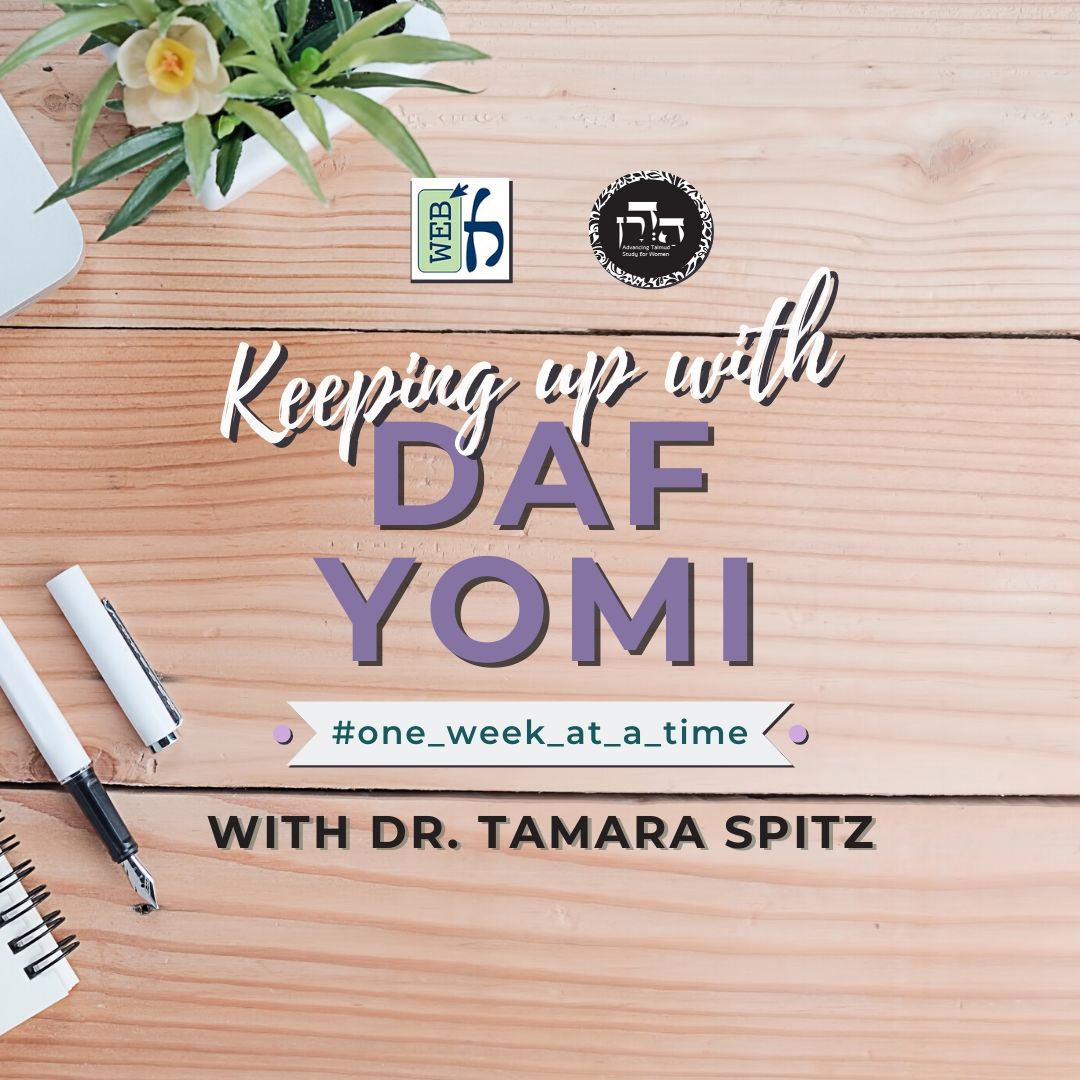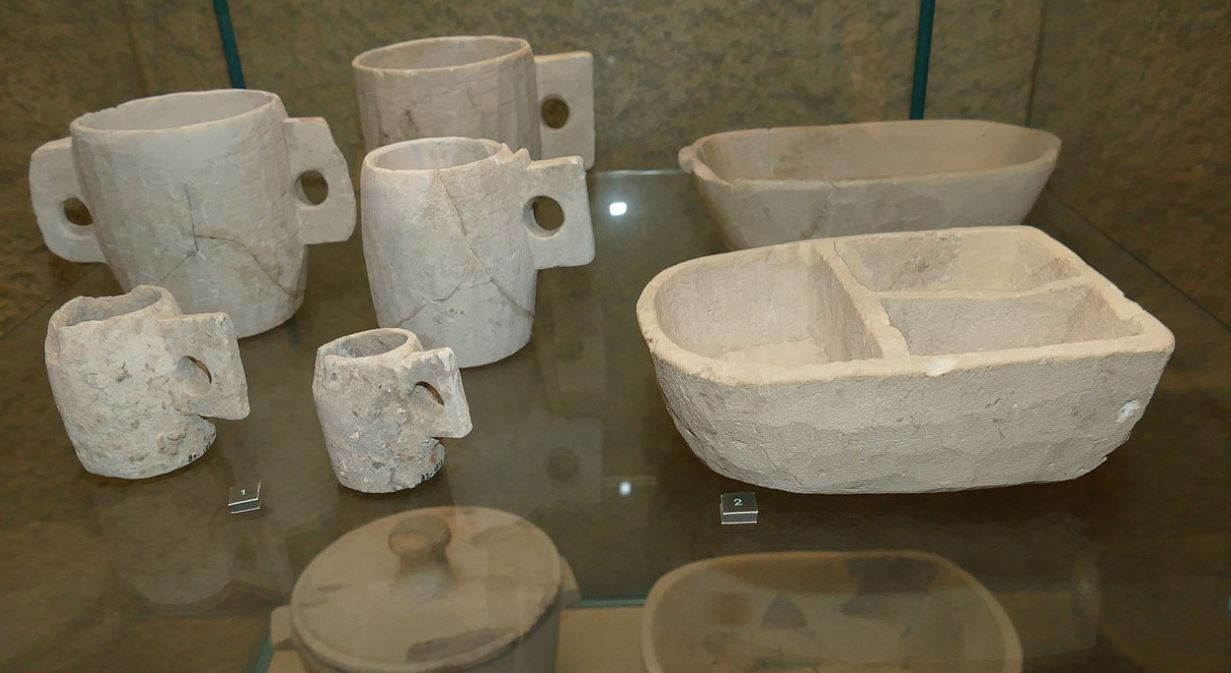Chagigah 25
הַמְדוּמָּעוֹת — נֶאֱמָנִין עֲלֵיהֶם בִּשְׁעַת הַגִּיתּוֹת וְהַבַּדִּים, וְקוֹדֶם לַגִּיתּוֹת שִׁבְעִים יוֹם.
that are mingled, amei ha’aretz are trusted with regard to them during the period of the winepress and the olive press, and also up to seventy days before the winepress, for that is when people begin to purify their vessels in preparation for the wine-pressing season.
גְּמָ׳ בִּיהוּדָה אִין, וּבַגָּלִיל לָא, מַאי טַעְמָא?
GEMARA: The mishna teaches that amei ha’aretz are trusted with regard to the purity of sacrificial wine and oil in Judea. The Gemara infers: In Judea, yes, but in the Galilee, no. What is the reason for this distinction between the two places?
אָמַר רֵישׁ לָקִישׁ: מִפְּנֵי שֶׁרְצוּעָה שֶׁל כּוּתִים מַפְסֶקֶת בֵּינֵיהֶן.
Reish Lakish said: It is because a strip of land inhabited by Samaritans [Kutim] separates between Judea and the Galilee, and it is impossible to travel from one land to the other without traversing this strip. The Sages decreed that lands inhabited by non-Jewish nations are considered ritually impure, so that it would be impossible to transport food from the Galilee to Judea, where the Temple is located, without the food becoming impure. Therefore, even oil and wine prepared by ḥaverim who lived in the Galilee were not accepted for sacrificial use.
וְנֵיתֵיב בְּשִׁידָּה תֵּיבָה וּמִגְדָּל? הָא מַנִּי — רַבִּי הִיא, דְּאָמַר: אֹהֶל זָרוּק — לָאו שְׁמֵיהּ אֹהֶל. דְּתַנְיָא: הַנִּכְנָס לְאֶרֶץ הָעַמִּים בְּשִׁידָּה תֵּיבָה וּמִגְדָּל, רַבִּי מְטַמֵּא, וְרַבִּי יוֹסֵי בְּרַבִּי יְהוּדָה מְטַהֵר.
The Gemara raises a difficulty: And let the residents of the Galilee place the wine and oil and transport it to Judea in a closed box, a chest, or a closet, whose contents cannot contract impurity, as they have the status of separate tents. The Gemara answers: In accordance with whose opinion is this mishna? It is in accordance with the opinion of Rabbi Yehuda HaNasi, who said: A thrown tent, i.e., a moving tent, is not called a proper tent, and therefore its contents are subject to impurity. In our case, then, the contents would contract the impurity decreed upon the lands of non-Jewish nations. As it is taught in a baraita: Concerning one who enters a land of non-Jewish nations sitting in a box, a chest, or a closet, Rabbi Yehuda HaNasi declares him to be impure, and Rabbi Yosei, son of Rabbi Yehuda, declares him to be pure.
וְלַיְיתוּהּ בִּכְלִי חֶרֶס הַמּוּקָּף צָמִיד פָּתִיל! אָמַר רַבִּי אֱלִיעֶזֶר, שׁוֹנִין: אֵין הַקֹּדֶשׁ נִיצּוֹל בְּצָמִיד פָּתִיל.
The Gemara raises a further difficulty: And let them bring oil and wine to the Temple in an earthenware vessel sealed with a tightly bound cover, which cannot contract impurity even if it is in the same tent as a corpse, as it states: “And every open vessel, which has no covering tightly bound upon it, is unclean” (Numbers 19:15). Rabbi Eliezer said: The Sages taught in a baraita: Sacrificial food, unlike other items, is not spared from impurity by being in a container with a tightly bound cover.
וְהָתַנְיָא: אֵין חַטָּאת נִיצֹּלֶת בְּצָמִיד פָּתִיל. מַאי לָאו: הָא קֹדֶשׁ נִיצּוֹל! לָא: הָא מַיִם שֶׁאֵינָן מְקוּדָּשִׁים נִיצּוֹלִין בְּצָמִיד פָּתִיל.
The Gemara asks: But isn’t it taught in a baraita: Water of purification containing ashes from the red heifer is not spared from impurity by being in a vessel with a tightly bound cover? What, is it not implied in the baraita this inference: That sacrificial food is spared from impurity in such a situation? The baraita seems to imply that this is a special stringency for water of purification, which does not apply to anything else, including sacrificial food. The Gemara rejects this: No, the baraita’s inference should be understood differently, as this: Water that has not yet been consecrated by being mixed with ashes of the red heifer is spared from impurity by being in a vessel with a tightly bound cover, even if they are designated for such a use at a later stage.
וְהָאָמַר עוּלָּא: חַבְרַיָּיא מְדַכַּן בְּגָלִילָא! מַנִּיחִין, לִכְשֶׁיָּבֹא אֵלִיָּהוּ וִיטַהֲרֶנָּה.
The Gemara raises another difficulty: But didn’t Ulla say: Ḥaverim purify their wine and oil, i.e., they produce their wine and oil by the standards of purity used for sacrificial food in the Galilee, to be used for sacrificial purposes? This indicates that there must have been some way of transporting them from the Galilee to the Temple, for otherwise why would they have prepared such items? The Gemara answers: Indeed, they could not transfer these items to the Temple. Rather, they would leave them in their place, and their thought was that when Elijah comes in messianic times and purifies the road from Galilee to Judea, these items will become eligible for use.
וּבִשְׁעַת הַגִּיתּוֹת נֶאֱמָנִין אַף עַל הַתְּרוּמָה. וּרְמִינְהִי: הַגּוֹמֵר זֵיתָיו — יְשַׁיֵּיר קוּפָּה אַחַת וְיִתְּנֶנָּה לְעָנִי כֹּהֵן!
§ It was taught in the mishna: And during the period of the winepress and olive press, amei ha’aretz are trusted even with regard to the purity of teruma. And the Gemara raises a contradiction from the following teaching: An am ha’aretz who finishes pressing his olives should leave over one sack of unpressed olives, and give it to a poor priest as teruma, so that the priest himself can make ritually pure oil from it. This shows that even during the period of the olive press the am ha’aretz is not trusted to make pure olive oil himself.
אָמַר רַב נַחְמָן, לָא קַשְׁיָא: הָא בְּחָרְפֵי, הָא בְּאַפְלֵי. אֲמַר לֵיהּ רַב אַדָּא בַּר אַהֲבָה: כְּגוֹן מַאי? כְּאוֹתָן שֶׁל בֵּית אָבִיךָ.
Rav Naḥman said: This is not difficult. This case of the mishna, where amei ha’aretz are trusted to produce pure olive oil themselves, is referring to people who press their olives early, during the regular season of the olive press, while that case is referring to those who press their olives later, after the period when most people press their olives has passed. Rav Adda bar Ahava said to him: Such as what case, for example? Such as those olives of your father’s house. Rav Naḥman’s father had many olives, and he often pressed them after the regular pressing season.
רַב יוֹסֵף אָמַר: בְּגָלִילָא שָׁנוּ. אֵיתִיבֵיהּ אַבָּיֵי: עֵבֶר הַיַּרְדֵּן וְהַגָּלִיל — הֲרֵי הֵן כִּיהוּדָה, נֶאֱמָנִין עַל הַיַּיִן בִּשְׁעַת הַיַּיִן וְעַל הַשֶּׁמֶן בִּשְׁעַת הַשֶּׁמֶן, אֲבָל לֹא עַל הַיַּיִן בִּשְׁעַת הַשֶּׁמֶן וְלֹא עַל הַשֶּׁמֶן בִּשְׁעַת הַיַּיִן.
Rav Yosef said a different resolution of the above contradiction. The source that states that amei ha’aretz are not trusted was taught with regard to the Galilee, and as the mishna taught earlier concerning sacrificial wine and oil, amei ha’aretz are trusted only in Judea and not in the Galilee. Abaye raised an objection to him from a baraita: Transjordan and the Galilee are like Judea, in that they are trusted with regard to wine of teruma during the period of wine production, and with regard to oil of teruma during the period of oil production. However, they are not trusted with regard to wine during the period of oil production, nor are they trusted with regard to oil during the period of wine production. This baraita shows that with regard to teruma there is no difference between the trustworthiness of amei ha’aretz who live in the Galilee and that of those who live in Judea.
אֶלָּא מְחַוַּורְתָּא כִּדְשַׁנִּין מֵעִיקָּרָא.
Rather, Rav Yosef’s answer must be rejected, and it is clear that the correct answer is as we answered initially, that it is speaking of the period following the conclusion of the winepress.
עָבְרוּ הַגִּיתּוֹת וְהַבַּדִּים וְהֵבִיאוּ לוֹ חָבִית שֶׁל יַיִן — לֹא יְקַבְּלֶנָּה הֵימֶנּוּ, אֲבָל מַנִּיחָהּ לַגַּת הַבָּאָה. בְּעוֹ מִינֵּיהּ מֵרַב שֵׁשֶׁת: עָבַר וְקִיבְּלָהּ, מַהוּ שֶׁיַּנִּיחֶנָּה לַגַּת הַבָּאָה? אֲמַר לְהוּ: תְּנֵיתוּהָ:
§ It was taught in the mishna: Once the periods of the winepress and olive press have passed, if amei ha’aretz brought to a ḥaver priest a barrel of teruma wine, he may not accept it from them. But the giver may leave it over for the following winepress season, in the following year. They raised a dilemma before Rav Sheshet: If the priest violated the halakha and did accept the wine from an am ha’aretz, what is the halakha? Is it permissible that he should leave it over for himself for the following winepress season? Since it is permissible to accept the wine and oil of an am ha’aretz intentionally left until that time, perhaps it is also permissible if the priest himself intentionally leaves it over until that time. He said to him: You learned it in a mishna (Demai 6:9):
חָבֵר וְעַם הָאָרֶץ שֶׁיָּרְשׁוּ אֶת אֲבִיהֶם עַם הָאָרֶץ, יָכוֹל לוֹמַר לוֹ: טוֹל אַתָּה חִטִּין שֶׁבְּמָקוֹם פְּלוֹנִי, וַאֲנִי חִטִּין שֶׁבְּמָקוֹם פְּלוֹנִי.
In the case of a ḥaver and an am ha’aretz, who are brothers and inherited property from their father, who was also an am ha’aretz, the ḥaver can say to his am ha’aretz brother: You take the wheat that is in such and such a place and I will take the wheat that is in such and such a place. The ḥaver knows that the former batch of wheat had been made susceptible to impurity, and he would therefore have no use for it, while the latter batch had not been made susceptible to impurity.
טוֹל אַתָּה יַיִן שֶׁבְּמָקוֹם פְּלוֹנִי, וַאֲנִי יַיִן שֶׁבְּמָקוֹם פְּלוֹנִי.
The mishna continues: Similarly, the ḥaver brother may say to the am ha’aretz brother: You take the wine that is in such and such a place and I will take the wine that is in such and such a place. The ḥaver knows that the latter batch of wine has not been rendered impure, and he wants to take that batch as his share. When brothers inherit a quantity of a certain item they will each end up receiving an equal share of that item. Therefore, the principle of retroactive designation applies, meaning that it is considered that whatever portion any particular brother receives in the end is the one that had been designated for him as his inheritance from the beginning. It is not considered to be a trade or a business transaction with the other brothers in exchange for their portions.
אֲבָל לֹא יֹאמַר לוֹ: טוֹל אַתָּה לַח וַאֲנִי יָבֵשׁ, טוֹל אַתָּה חִטִּין וַאֲנִי שְׂעוֹרִים.
The mishna continues: But the ḥaver brother may not say to the am ha’aretz brother: You take the wet produce and I will take the dry produce. Nor may he say: You take the wheat, and I will take the barley. The principle of retroactive designation does not apply to objects of different types. If one brother would take wheat and the other barley it would be considered a trade. And it is prohibited for a ḥaver to sell or transfer impure produce or produce that is susceptible to impurity to an am ha’aretz, who does not strictly follow the principles of purity, as this would involve the prohibition of “You shall not place a stumbling-block before the blind” (Leviticus 19:14).
וְתָנֵי עֲלַהּ: אוֹתוֹ חָבֵר שׂוֹרֵף הַלַּח, וּמַנִּיחַ אֶת הַיָּבֵשׁ.
And it is taught in a baraita with regard to this mishna: If the ḥaver receives a share that consists of some items that are wet and some that are dry, that ḥaver must burn the wet produce if it was teruma, as it has certainly been defiled and impure teruma is burned, but he may leave the dry produce and use it, as it can be assumed that it has not been defiled.
אַמַּאי? יַנִּיחֶנָּה לַגַּת הַבָּאָה! בַּדָּבָר שֶׁאֵין לוֹ גַּת. וְיַנִּיחֶנּוּ לָרֶגֶל! בְּדָבָר שֶׁאֵינוֹ מִשְׁתַּמֵּר לָרֶגֶל.
The Gemara draws a conclusion based on this baraita: Why must he burn the wet teruma? Let him leave it over until the following winepress season, during which time teruma from an am ha’aretz is considered pure. The fact that this option is not taken into account indicates that one may not intentionally leave over teruma received from an am ha’aretz until the next winepress season, which would resolve the dilemma presented to Rav Sheshet. The Gemara rejects this proof: Here it is referring to something that does not have a winepress, i.e., to liquids that are never used in the Temple service, as amei ha’aretz are careful only with regard to liquids that may be used in the Temple service. The Gemara asks: Even so, there is another option: And let him leave it for the next pilgrimage Festival, for the mishna later teaches (26a) that amei ha’aretz are assumed to observe all laws of ritual purity on Festivals. The Gemara answers: It is referring to something that would not last until the next pilgrimage Festival, but which would spoil beforehand. The dilemma presented to Rav Sheshet therefore remains unresolved.
וְאִם אָמַר הִפְרַשְׁתִּי לְתוֹכָהּ רְבִיעִית קֹדֶשׁ — נֶאֱמָן. תְּנַן הָתָם: מוֹדִין בֵּית שַׁמַּאי וּבֵית הִלֵּל שֶׁבּוֹדְקִין לְעוֹשֵׂי פֶסַח, וְאֵין בּוֹדְקִין לְאוֹכְלֵי תְרוּמָה.
§ It was taught in the mishna: And if the giver says to the priest: I separated and placed into this barrel of teruma a quarter–log of sacrificial wine or oil, he is deemed credible. The Gemara proceeds to cite a mishna in tractate Oholot, the discussion of which ultimately relates to this mishna here: We learned in a mishna elsewhere (Oholot 18:4): Beit Shammai and Beit Hillel agree that one may examine the ground for those performing the paschal offering, but one may not examine the ground for those who eat teruma.
מַאי בּוֹדְקִין? אָמַר רַב יְהוּדָה אָמַר שְׁמוּאֵל: מְנַפֵּחַ אָדָם בֵּית הַפְּרָס וְהוֹלֵךְ.
The Gemara asks: What is the meaning of: One may examine? Rav Yehuda said that Shmuel said: A person may blow at the ground of a beit haperas and walk through it as he does so. A beit haperas is a patch of ground with a grave in it that was subsequently plowed over. The Sages were concerned that there might be small pieces of human bone scattered in the field, which would impart impurity to anyone moving them with his foot. Therefore, they decreed that whoever traverses such a field becomes impure. However, the Sages allowed one to pass through the field while maintaining his purity if he blows on the ground as he goes, the assumption being that any small pieces of bone would thereby be blown out of his path. This is the examination to which this mishna refers. The mishna teaches that this examination is sufficient to allow one to retain his purity as he goes to perform the paschal offering, but not to allow one to retain his purity with regard to the eating of teruma.
וְרַבִּי חִיָּיא בַּר אַבָּא מִשְּׁמֵיהּ דְּעוּלָּא אָמַר: בֵּית הַפְּרָס שֶׁנִּדַּשׁ — טָהוֹר לְעוֹשֵׂי פֶסַח. לֹא הֶעֱמִידוּ דִּבְרֵיהֶן בִּמְקוֹם כָּרֵת.
And Rabbi Ḥiyya bar Abba said in the name of Ulla: A beit haperas that has been trodden by passersby who have beaten a path through it is considered pure for those who are on their way to perform the paschal offering, as the assumption is that no more bone fragments remain on the surface of the ground. The examination referred to in the mishna, then, is referring to ascertaining whether a particular beit haperas has been trodden or not. The reason for this leniency is that the impure status of a beit haperas is only a rabbinical decree, and the Sages did not uphold their words decreeing the field to be impure in a place where this affects one’s ability to perform a mitzva involving karet; and failure to bring a paschal offering is punishable by karet.
לְאוֹכְלֵי תְרוּמָה הֶעֱמִידוּ דִּבְרֵיהֶן בִּמְקוֹם מִיתָה.
However, with regard to those who wish to eat teruma after traversing a beit haperas, the Sages did uphold their words decreeing the field to be impure in a place of a sin involving the punishment of death by God’s hand. The sin of eating teruma in a state of impurity is punishable by death by God’s hand, and the Sages were therefore strict in insisting that one not eat it after traversing a beit haperas.
אִיבַּעְיָא לְהוּ: בָּדַק לְפִסְחוֹ, מַהוּ שֶׁיֹּאכַל בִּתְרוּמָתוֹ? עוּלָּא אָמַר: בָּדַק לְפִסְחוֹ — מוּתָּר לֶאֱכוֹל בִּתְרוּמָתוֹ. רַבָּה בַּר עוּלָּא אָמַר: בָּדַק לְפִסְחוֹ — אָסוּר לֶאֱכוֹל בִּתְרוּמָתוֹ.
A dilemma was raised before the scholars: If one examined a beit haperas for the purpose of bringing his paschal offering, what is the halakha with regard to teruma after he has traversed the field? Is it permissible that he can rely on this examination to eat his teruma as well, since his passage through the field has been established as not having defiled him? Ulla said: If he examined the ground for purposes of bringing his paschal offering, he is permitted afterward to eat his teruma, for once he is declared pure with regard to the offerings it would be inconsistent to declare him at the same time impure with regard to teruma. But Rabba bar Ulla said: If one examined the ground for purposes of bringing his paschal offering, it is prohibited for him to eat his teruma.
אֲמַר לֵיהּ הָהוּא סָבָא: לָא תִּפְלוֹג עֲלֵיהּ דְּעוּלָּא, דִּתְנַן כְּווֹתֵיהּ: וְאִם אָמַר הִפְרַשְׁתִּי לְתוֹכָהּ רְבִיעִית קֹדֶשׁ — נֶאֱמָן, אַלְמָא: מִדִּמְהֵימַן אַקֹּדֶשׁ מְהֵימַן נָמֵי אַתְּרוּמָה, הָכָא נָמֵי: מִדִּמְהֵימַן אַפֶּסַח, מְהֵימַן נָמֵי אַתְּרוּמָה.
A certain older man said to Rabba bar Ulla: Do not argue with Ulla, as we learned in the mishna in accordance with his opinion, for the mishna states: And if the am ha’aretz says to the priest: I separated and placed into this barrel of teruma a quarter-log of sacrificial wine or oil, he is deemed credible. Apparently, then, once the am ha’aretz is deemed credible with regard to the sacrificial items in the barrel he is also deemed credible with regard to the teruma in it. Here too, the same principle should be applied, so once he is deemed credible and is considered pure with regard to the paschal offering, he is also deemed credible with regard to teruma.
כַּדֵּי יַיִן וְכַדֵּי שֶׁמֶן כּוּ׳. תָּנָא: אֵין נֶאֱמָנִין לֹא עַל הַקַּנְקַנִּים וְלֹא עַל הַתְּרוּמָה. קַנְקַנִּים דְּמַאי? אִי קַנְקַנִּים דְּקֹדֶשׁ — מִיגּוֹ דִּמְהֵימַן אַקֹּדֶשׁ, מְהֵימַן נָמֵי אַקַּנְקַנִּים! אֶלָּא קַנְקַנִּים דִּתְרוּמָה — פְּשִׁיטָא, הַשְׁתָּא אַתְּרוּמָה לָא מְהֵימַן, אַקַּנְקַנִּים מְהֵימַן?
§ It was taught in the mishna: Concerning jugs of wine and jugs of oil that are mingled, amei ha’aretz are deemed credible during the period of the winepress and the olive press. A Sage taught in a baraita: Amei ha’aretz are not deemed credible, neither with regard to flasks nor with regard to teruma. The Gemara asks: Flasks of what? If it is referring to flasks of sacrificial food, since an am ha’aretz is deemed credible concerning the sacrificial items it contains, he must necessarily be deemed credible concerning the flasks as well. Rather, it is referring to flasks of teruma. But this is obvious: Now, if he is not deemed credible concerning the teruma itself, is it possible that he would be deemed credible concerning the flasks containing it?
אֶלָּא בְּרֵיקָנִים דְּקֹדֶשׁ וּבִשְׁאָר יְמוֹת הַשָּׁנָה, וּבִמְלֵאִין דִּתְרוּמָה וּבִשְׁעַת הַגִּיתּוֹת.
The Gemara answers: Rather, it is referring to empty flasks that had contained sacrificial food during the rest of the days of the year, i.e., during all the days of the year, for an am ha’aretz is deemed credible with regard to sacrificial food throughout the year, yet he is not deemed credible with regard to its flask once the food has been removed, and it is referring as well to flasks full of teruma wine during the period of the winepress, when they are deemed credible with regard to the teruma itself, but not the vessels.
תְּנַן: כַּדֵּי יַיִן וְכַדֵּי שֶׁמֶן הַמְדוּמָּעוֹת. מַאי לָאו, מְדוּמָּעוֹת דִּתְרוּמָה. אָמְרִי דְּבֵי רַבִּי חִיָּיא: מְדוּמָּעוֹת דְּקֹדֶשׁ.
The Gemara asks a question: We learned in the mishna: With regard to jugs of wine and jugs of oil that are mingled [meduma], amei ha’aretz are deemed credible during the period of the winepress and the olive press, and seventy days before the winepress. The Gemara asks: What, is it not so that mingled means that there is a mixture of teruma oil or wine in the jug, and yet the mishna states that amei ha’aretz are deemed credible with regard to the jugs? This would appear to contradict the ruling of the baraita that they are not deemed credible with regard to flasks containing teruma. The Gemara answers: In the school of Rabbi Ḥiyya they say that the mishna in fact is referring to ordinary oil or wine mingled with sacrificial wine or oil, so that it contains a certain amount of sacrificial liquid.
וּמִי אִיכָּא דִּימּוּעַ לְקֹדֶשׁ? אָמְרִי דְּבֵי רַבִּי אִלְעַאי: בִּמְטַהֵר אֶת טִבְלוֹ לִיטּוֹל מִמֶּנּוּ נְסָכִים.
The Gemara asks: And does the concept of meduma apply to sacrificial foods at all? This term meduma applies only to teruma, not to sacrificial items. In the school of Rabbi Elai they say that the halakha of the mishna is stated with regard to one who is keeping his wine tevel, i.e., produce from which the requisite teruma and tithes have not yet been separated, in purity, because he intends to take wine for libations from it. It is therefore in a sense a mixture of sacrificial food, teruma and non-sacred food all in one, and accordingly the term meduma is applicable. The mishna is teaching that since the am ha’aretz is deemed credible with regard to the sacrificial food in this mixture, he is also deemed credible with regard to the teruma and the jugs.
קוֹדֶם לַגִּיתּוֹת שִׁבְעִים יוֹם. אָמַר אַבָּיֵי, שְׁמַע מִינַּהּ: דִּינָא הוּא דְּעִילָּוֵי אֲרִיסָא לְמִיטְרַח אַגּוּלְפֵי שִׁבְעִים יוֹמִין מִקַּמֵּי מַעְצַרְתָּא.
§ It is taught in the mishna that apart from the period of the winepress itself, amei ha’aretz are also deemed credible seventy days before the period of the winepress. Abaye said: You can learn from here, incidental to the laws of purity, that the law is that a tenant farmer in a vineyard must make the effort of acquiring flasks for the wine seventy days before the time of the winepress, for the mishna considers this amount of time the period of preparation for the pressing of grapes.
מַתְנִי׳ מִן הַמּוֹדִיעִים וְלִפְנִים נֶאֱמָנִין עַל כְּלֵי חֶרֶס. מִן הַמּוֹדִיעִים וְלַחוּץ — אֵין נֶאֱמָנִין. כֵּיצַד? הַקַּדָּר שֶׁהוּא מוֹכֵר הַקְּדֵרוֹת, נִכְנַס לִפְנִים מִן הַמּוֹדִיעִים, הוּא הַקַּדָּר וְהֵן הַקְּדֵרוֹת וְהֵן הַלּוֹקְחִין — נֶאֱמָן, יָצָא — אֵינוֹ נֶאֱמָן.
MISHNA: From Modi’im and inward toward Jerusalem, i.e., in the area surrounding Jerusalem, up to the distance of the town of Modi’im, which is fifteen mil from Jerusalem, all potters, including amei ha’aretz, are deemed credible with regard to the purity of earthenware vessels that they have produced. Because these places supplied earthenware vessels for the people in Jerusalem, the Sages did not decree impurity for them. From Modi’im and outward, however, they are not deemed credible. The details of this ruling are specified: How so? A potter who sells pots, if he entered within Modi’im from outside it, although the potter, and the pots, and the customers were all previously located outside Modi’im, where he is not deemed credible with regard to purity, he is now deemed credible. And the opposite is true of the opposite case: If the same person who was deemed credible inside left the boundaries of Modi’im, he is no longer deemed credible.
גְּמָ׳ תָּנָא: מוֹדִיעִים — פְּעָמִים כְּלִפְנִים, פְּעָמִים כְּלַחוּץ. כֵּיצַד? קַדָּר יוֹצֵא וְחָבֵר נִכְנָס — כְּלִפְנִים. שְׁנֵיהֶן נִכְנָסִין
GEMARA: A tanna taught in a baraita: With regard to Modi’im itself, there are times that it is considered like inside the perimeter surrounding Jerusalem, and there are times that it is considered like outside that perimeter. How so? If a potter is leaving the perimeter and a ḥaver is entering it, and they meet in Modi’im, it is considered like inside, and the ḥaver may purchase the jugs. However, if both are entering the perimeter




